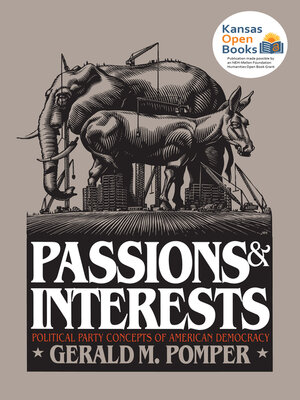Passions and Interests
ebook ∣ Political Party Concepts of American Democracy · American Political Thought
By Gerald M. Pomper

Sign up to save your library
With an OverDrive account, you can save your favorite libraries for at-a-glance information about availability. Find out more about OverDrive accounts.
Find this title in Libby, the library reading app by OverDrive.



Search for a digital library with this title
Title found at these libraries:
| Library Name | Distance |
|---|---|
| Loading... |
Bridging analysis of political parties and political philosophy, Passions and Interests presents eight conceptual models of political parties with particular relevance to American democracy. Gerald Pomper, an internationally recognized scholar, asks three questions: What meanings are attributed to parties? Empirically, to what extent do American parties fit these concepts? How well do these different models serve democratic interests?
The analysis encompasses a broad range of individuals, including party theorists from Michels to Downs, practitioners such as Martin Van Buren and Woodrow Wilson, and political philosophers from Burke to Lenin. Beginning with Madison's definition, Pomper views parties as varying combinations of passions and interests. He examines, both empirically and normatively, models of party as bureaucratic organization, governing caucus, cause advocate, ideological community, social movement, urban machine, rational office-seeking team, and personal faction.
In further explorations, he analyzes these party models in the light of the historical record and empirical data on American voting behavior, then compares them to proposals for party reform in the United States. In conclusion, Pomper evaluates the contributions of U.S. political parties to democratic values and presents a program to strengthen the parties as institutions of American democracy.
"The growth of political parties and the extension of democracy proceed along parallel tracks," Pomper contends. "Competitive political parties facilitate, although they do not guarantee, a considerable measure of popular involvement, control, and policy determination. Without them, government is more likely to evidence authoritarianism, violence, and repression."
Open access edition funded by the National Endowment for Humanities and the Andrew W. Mellon Foundation Humanities Open Book Program.







